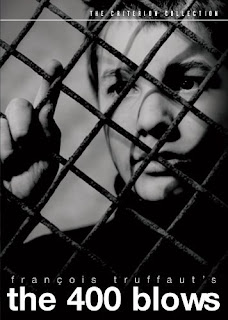
i took in a repeat viewing of truffaut's masterpiece this afternoon in aid of the poll being conducted over at empireonline, in which a group of fifty must choose the ten films that they deem to be the greatest of all time, before the results are colated and put into a hopefully definitive "best ever" type list. as a rule, im making an effort to rewatch each of the 20 or so films that have made my shortlist, before deciding upon my final ten.
"the 400 blows" was one of the films that shaped the way in which i look at and appreciate the "art" of cinema. while topically it wasnt literally relevant to the 16 year old boy that was watching it, visually it felt incredibly fresh, especially compared to the hollywood and mainstream cinema that i had only been exposed to at the point in which i saw "the 400 blows" for the first time. alongside jean-luc godard's "a bout de souffle" my interest in film was formed. i was sold on the notion that film as art was a viable concept.
having spent time in paris since last seeing the film i can suddenly appreciate just why the film and the city are so closely associated. obviously the very fact that the film is set in the city dictates that a close association comes fitted as standard, but there is a deeper connection. the opening credits, still an all time favourite, captures the love/hate relationship that the city has with the concept of the tourist, or the outsider. while attractions like the eiffel tower may not have been intended as the "attraction" that i have just deemed it, that is exactly what it is, and i feel that, based upon personal experiences, the opening credits of the film are almost claiming back the tower to the city. throughout the remainder of the film areas regularly associated with tourists (the champs elysees, the basilica, etc) are shown in a light expected more of bresson than the 'nouvelle vague'.
despite having seen the film inumerable times ''the 400 blows" remains as watchable as ever. the charm of the character of antoine doinel remains as affable as ever, with jean-pierre léaud playing the character that would become his most popular for the first time.
the final shot of the film still manages to be staggering in its execution. one of my oldest memories of the film is just how haunting i found this final shot to be, and can confirm that this is still the case. a beautiful shot that leaves the viewer with more questions than ones it answers throughout rest of the running time of the film. this is cinema, this is film, this is art.


Lovely review....
ReplyDelete